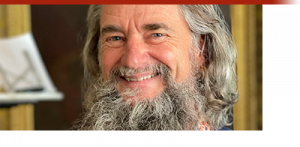Subscribe: Spotify | RSS | More
Jim continues his discussion with Bruce Damer on the origins of life…

Jim continues his discussion with Bruce Damer on the origins of life. They discuss Darwin’s “warm little pond” hypothesis, hydrothermal fields as selection engines, wet-dry cycling, proto-cells, competing theories, implications of the hypothesis, niche construction theory, the origin of life as mostly collaborative, the Probability Interaction Memory (PIM) model, effects of crowding together, sharing results, the emergence of memory, PIM as a general principle of emergence, Covid-19 as an example of amplification, applying PIM to civilizational health, the loss of face-to-face community membranes in late-stage capitalism, “hearthology,” applying PIM to the search for artificial general intelligence (AGI), collaborations with Ben Goertzel & Google’s AI group, protocellular systems as general learning systems, creating a genesis engine, the Fermi paradox & the Drake equation, the new concept of urability, the low probability of sustaining life long enough to reach complexity, new data from Mars & exoplanet atmospheres, the possibility that Earth is extremely rare, bringing the galaxy to life, creating hundreds of thousands of warm little ponds using asteroids, and much more.
- Episode Transcript
- JRS EP 167 – Bruce Damer on the Origins of Life
- BIOTA Institute
- JRS EP140 – Robin Dunbar on Friendship
- JRS Currents 072: Ben Goertzel on Viable Paths to True AGI
- The Open Cognition Project (OpenCog)
- Tierra (Wikipedia)
- Wonderful Life: The Burgess Shale and the Nature of History, by Stephen Jay Gould
- SETI Institute
Canadian-born Dr. Bruce Damer has spent his life pursuing two questions: how did life on Earth begin? and how can we give that life (and ourselves) a sustainable pathway into the future and a presence beyond the Earth? A decade of laboratory and field research with his collaborator Prof. David Deamer at UCSC and teams around the world resulted in the Hot Spring Hypothesis for an Origin of Life, published in Scientific American in 2017 and the journal Astrobiology in 2020. The scenario has now passed its first key experimental tests in the laboratory and at volcanic hot springs around the world and has emerged as a leading contender for a general theory of abiogenesis. Implications of the work are now spreading through evolutionary biology, philosophy, AI and the search for life beyond Earth. New work with collaborators has proposed the urability framework, how life can start on many different worlds, and addresses some aspects of the Fermi Paradox.
